Ars Electronica embodies a vibrant community in which art, technology and society merge. For us, society is more than just a concept – it is the dynamic interaction of people who jointly develop visions, find creative solutions and shape the future.
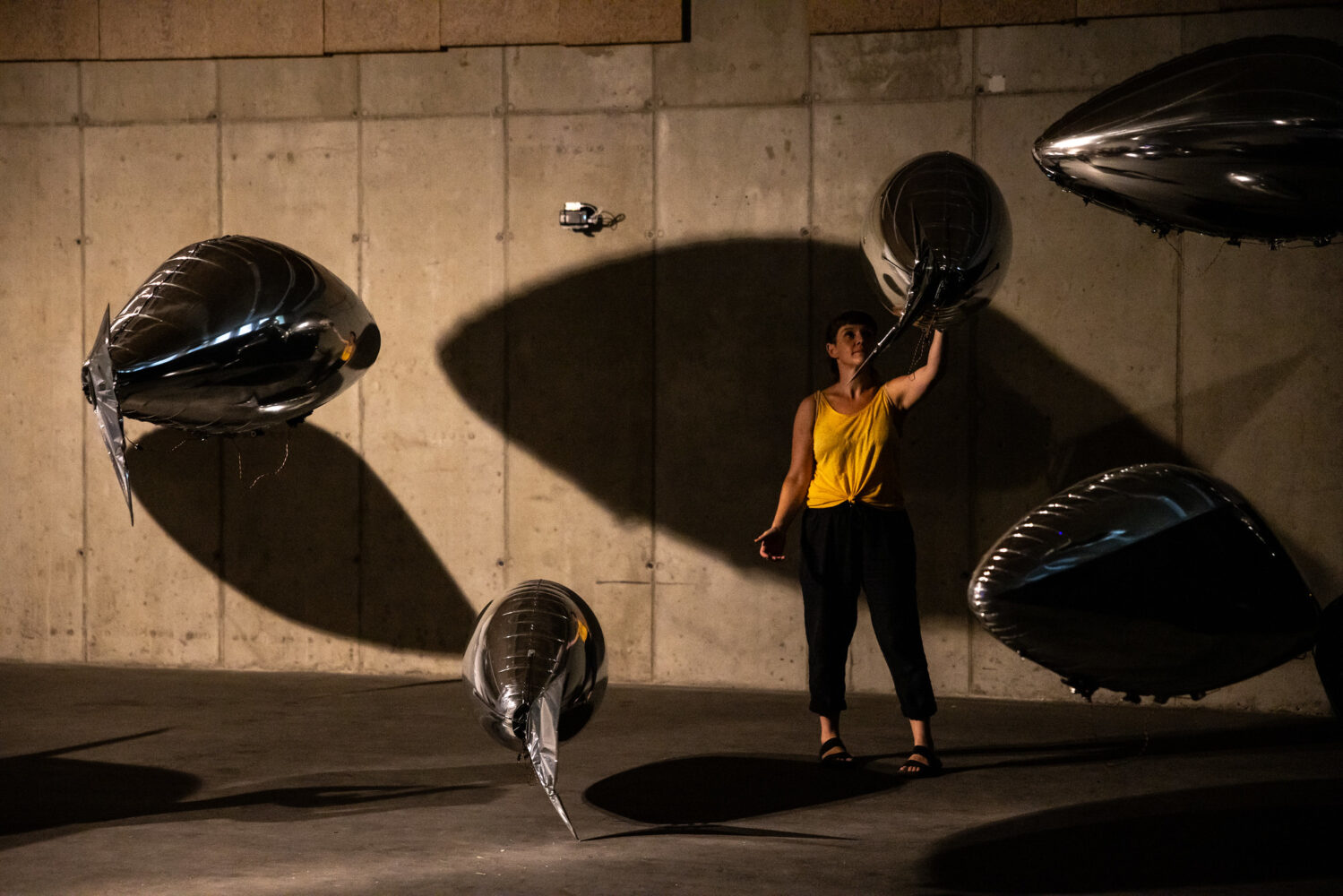
Year in Review 2024
As the year comes to a close, we take a moment to reflect on 365 days filled with exciting projects and events. We’ve captured the highlights of 2024 for you, centered around the three core pillars of Ars Electronica: art, technology, and society.
At Ars Electronica, we see ourselves as a platform that brings together art, technology and society. At a time when technological innovation often moves faster than social discourse, we see it as our task to create spaces for reflection, dialogue and creative solutions. We are a place where visions of the future are discussed, ideas are tested and new perspectives are developed.
Digitalisation, climate change, social inequality, geopolitical tensions – societal challenges pose complex questions and require new ways of thinking. In the face of these dynamics, the question of what constitutes a society is becoming ever more pressing.
From Hope to Action
A society is more than a construct of rules and structures – it is a living organism that is shaped by the fears, visions and hopes of each individual. It lives from the impulses of its members. This is precisely where the world’s largest media art festival came in, focusing on the importance of hope and its role as a unifying element of our society under the title “HOPE – who will turn the tide” in 2024.
Events like Ars Electronica are places where people come together to create new shared visions for a common future, to network and to exchange ideas. Space is created for dialogue, reflection and the creativity that is indispensable for overcoming social challenges. As in previous years, people – we – were at the center of the Festival 2024. Never before has Ars Electronica offered so many discussions, workshops and presentations. This year, special attention was paid to the people whose initiatives, projects and activities inspire hope – the artists. By experiencing the various projects up close, the audience was able to become aware of the “superpower” of artists, to inspire hope and eliminate indifference. Visitors were encouraged not only to address social problems, but also to reflect on their own responsibility in society and to actively participate in the discourse.
This year’s Open Futurelab offered festival visitors the opportunity to get to know our Futurelab empoleyees in person through workshops, interactive installations, inspiring talks and expert tours, to gain insights into their innovative projects and ideas, and to discuss and develop new ideas together. A special highlight was the Futurelab Night in Deep Space 8K at the Ars Electronica Center. Here, technological visions and artistic experiments were brought to life.
Since 2015, the STARTS exhibition has focused on initiatives and projects that deal not only with technological and design components, but also with the social, ecological, and economic challenges we face as a society today. Year after year, the exhibition demonstrates how artistic practice can contribute to opening a dialogue on pressing issues such as sustainability and social justice. This year’s winning projects, “Calculating Empires: A Genealogy of Power and Technology, 1500 – 2025” by Kate Crawford and Vladan Joler and the “Arts at CERN” project illustrate this by exploring the relationship between technology and society in different ways. While Crawford and Joler’s project invites audiences to question the social impact of technological developments, the Arts at CERN project promotes exchanges between artists and scientists, inviting them to explore the interfaces between art and particle physics in order to reflect on the role of technology in our society.
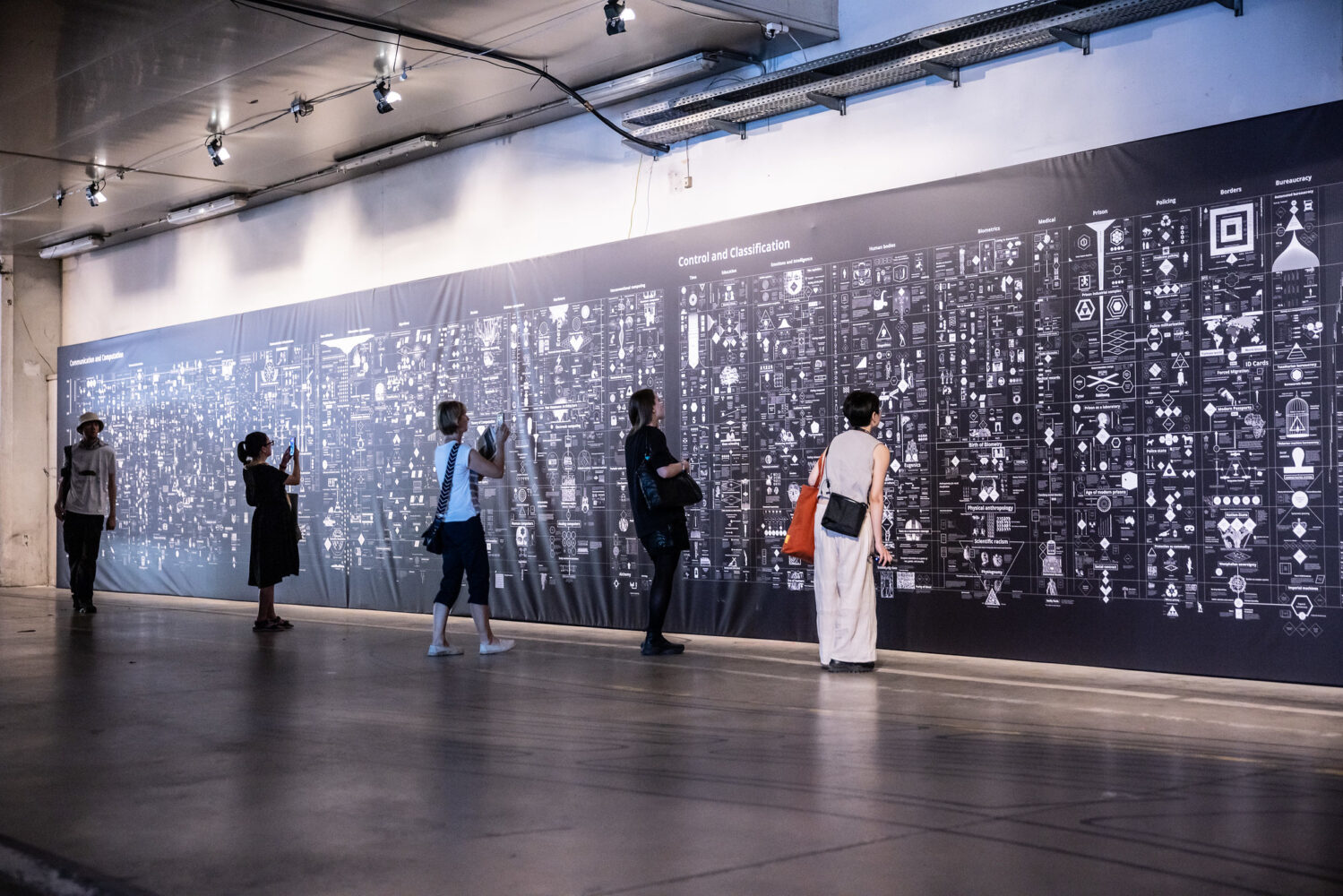
In addition, the S+T+A+RTS Prize Africa was awarded for the first time in 2024. The prize recognizes outstanding regional initiatives and is awarded as an African extension of the renowned S+T+ARTS Prize. This year’s main prize went to CATPC’s “Balot NFT” project, an innovative model that uses NFTS to transform African cultural assets into collective goods and thus into an important instrument of the decolonization movement. The winning projects were exhibited at this year’s Ars Electronica Festival and presented to an international audience.
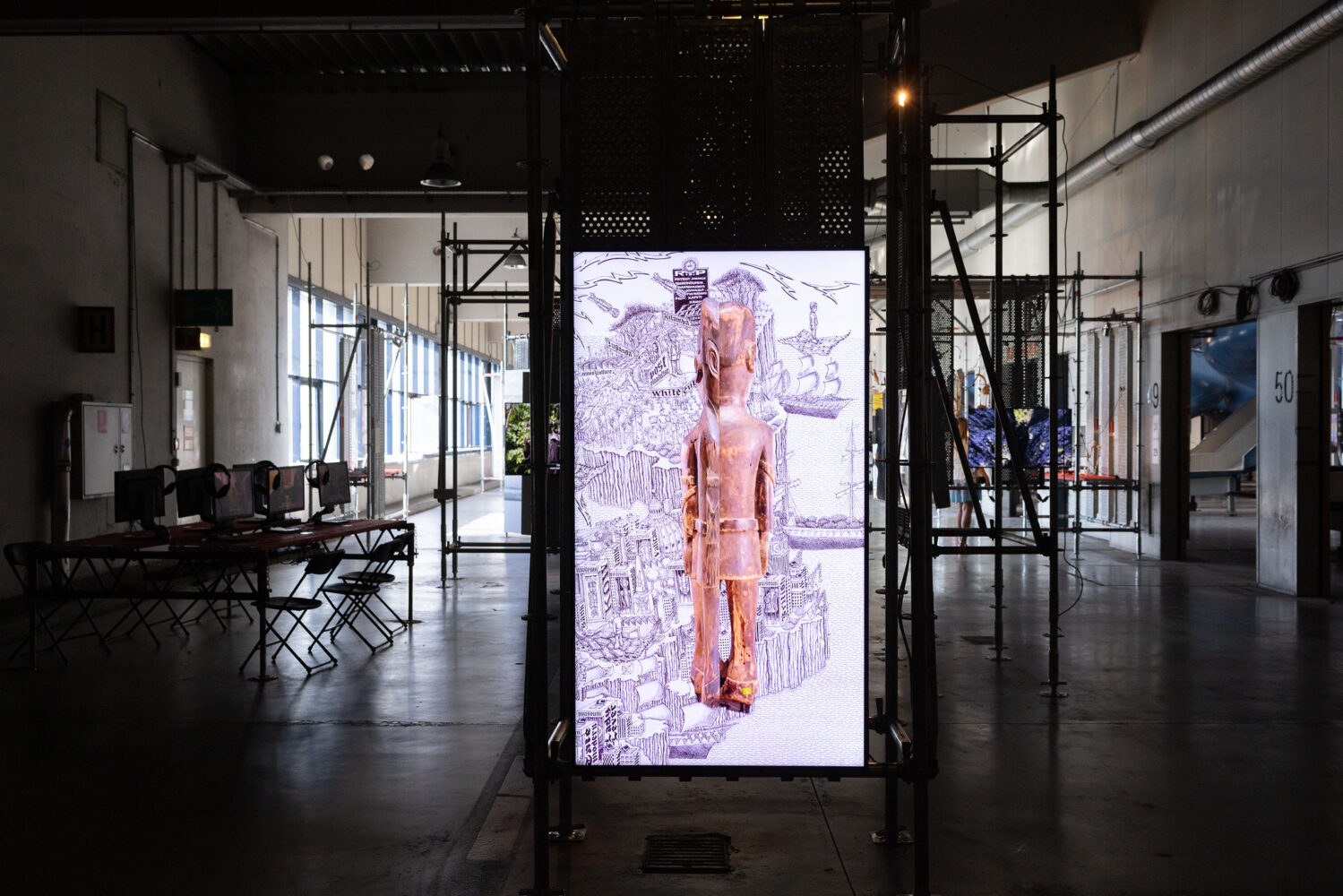
Let’s take a look back at this year’s create your world festival, which was held as an integral part of the Ars Electronica Festival – a true “festival within the festival. As in previous years, visitors to the create your world area were able to experiment, learn about new technologies, discover various open labs and broaden their horizons. Whether it was 10 minutes or a whole day, everyone could decide how much time they wanted to devote to a project. Our individual responsibility and collective hope are the key to turning the tide and shaping a positive future. – That’s why this year’s theme was: The Page Turners. At the heart of POSTCITY, the create your world area was transformed into a playground for artists, associations and companies, offering creative thinkers and those thirsty for knowledge an ideal space to immerse themselves in the world of tomorrow.
Let’s move on to another important part of Ars Electronica that deals with the social challenges of our time. The European Union Prize for Citizen Science. It is more than a competition – it is a strong commitment to social and political change in Europe, honoring projects that actively promote an inclusive, pluralistic and sustainable society. The INCREASE project, which won the Prize in 2024, combines excellent scientific research with citizen science to raise awareness of agrobiodiversity and nutrition. It educates stakeholders and decision-makers on sustainable agriculture and is a powerful example of how collaboration between citizens and leading research centers can drive scientific excellence and social inclusion.

Another prize, which was awarded for the fourth time in 2024 as part of the Prix Ars Electronica in cooperation with the Austrian Federal Ministry for European and International Affairs is the Award for Digital Humanity, which emphasizes the importance of cultural exchange and collaboration for social digital change. The Award recognizes artistic initiatives that address social and cultural issues in the digital society and promote collaborative approaches to creating new paths to digital humanism. The winning project “Patchwork Girl” is a powerful example of using art and technology to address pressing social issues such as sexting, shaming and online abuse. It uses digital tools to address the effects of online trauma while highlighting the process of self-empowerment through the creation of a digital identity. The project sets new standards for digital humanism and calls for concrete changes in the way we interact with digital spaces.
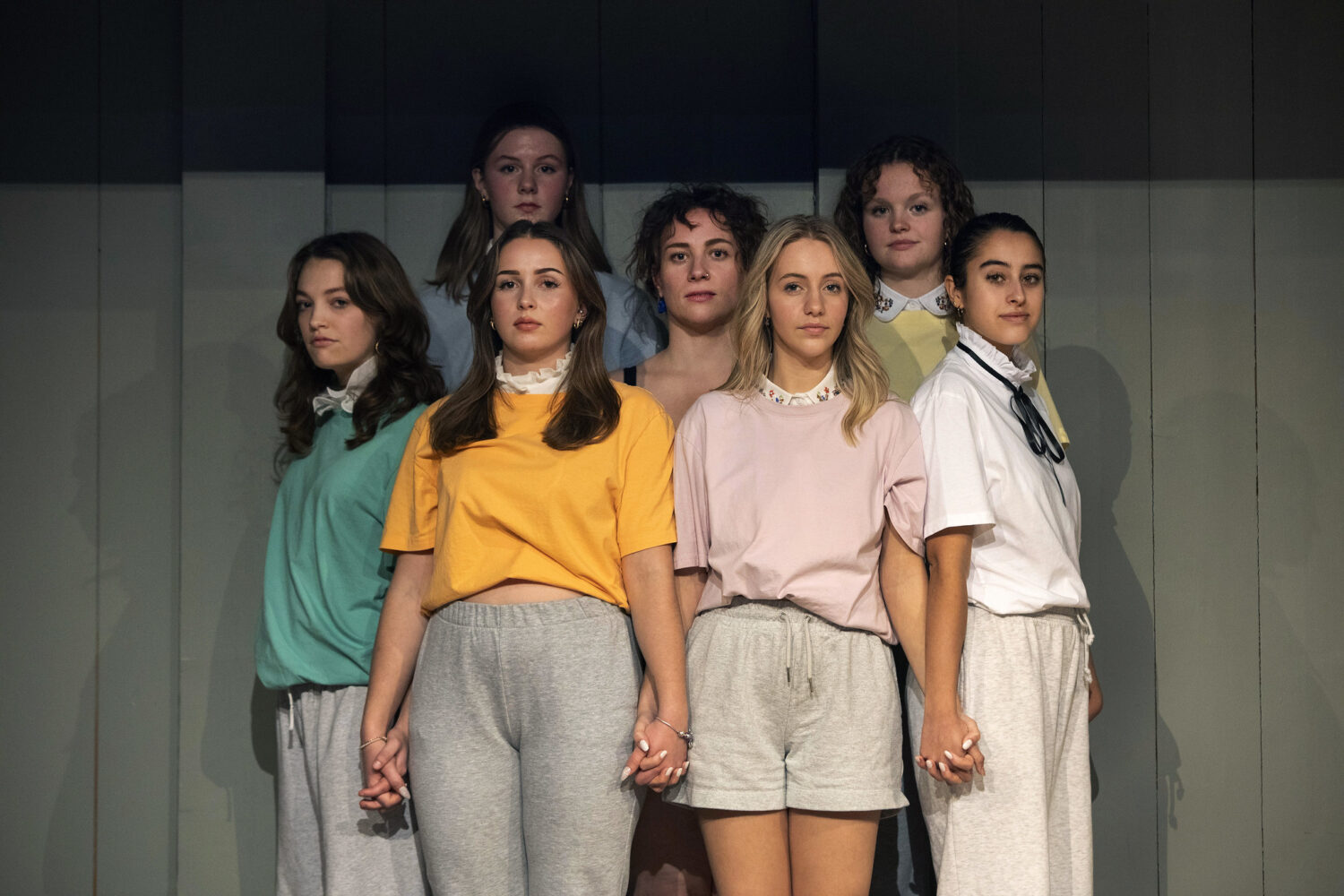
We look back on a year of intensive European cooperation that impressively demonstrates how interdisciplinary collaboration promotes innovation and cultural exchange. In 2024, European activities were bundled under the brand name “Ars Electronica Platform Europe”. More than 100 partner organisations worked together on 17 EU-funded projects. These collaborations developed new narratives about technology, the environment and society. The results were presented at the Festival, which once again served as a platform for international exchange in 2024.
Tomorrow’s Society – in the Museum of the Future
While the Festival and the Open Calls 2024 have stimulated global discussions and provided artistic impetus for a better future, it is equally important to us at Ars Electronica to inspire not only an international audience but also our local community in Linz and beyond. As the heart of our local activities, the Ars Electronica Center helps to continue the dialog about technology, society and art in everyday life.
This year, the Ars Electronica Center once again offered unforgettable evenings for young and old alike. Events such as the Long Night of Research and the Long Night of Museums transformed the Ars Electronica Center into a place of discovery and shared experience. From interactive stations to inspiring demonstrations, there was something for everyone.
We are especially passionate about the young members of our society. Not only do children and young people represent the future, their curiosity and creativity are already shaping the way we live together today. For this reason, the Ars Electronica Center has once again put together a diverse program for them. Whether it was during the semester, easter, summer, fall or winter break – there were always exciting workshops and activities to participate in. From music and the universe, to the human brain and microorganisms, to space travel and new technologies, there was something for every young researcher. A special highlight this year was the award ceremony for “Mission X – Train like an Astronaut“, an international competition organized by the ESERO office at the Ars Electronica Center in Austria that gave students the opportunity to immerse themselves in the world of space travel and playfully learn how astronauts train.
Acting sustainably, growing together
Sustainability and the protection of our planet have always been central concerns of Ars Electronica. With the festival theme “Welcome to Planet B” and the exhibition “There is no Planet B,” we have already underscored the urgency of sustainable action in the past. Our new exhibition “Connected Earth,” which opened at the Ars Electronica Center in November in cooperation with the Climate and Energy Fund, is a continuation of this commitment.
With “Connected Earth,” Ars Electronica is focusing on the inextricable link between humans, nature, technology and society. The works of art and scientific projects on display illuminate the complex interrelationships between natural ecosystems, human infrastructure, climate change and energy transition. The exhibition demonstrates not only the urgency of sustainable action, but also the opportunities for community involvement.
In 2024, the Ars Electronica Futurelab also addressed pressing environmental issues that will have a lasting impact on our society. One of these projects was the initiative “Schmilz, Schmilz, Baby!” by the activist artist group Aggro Climate, which dealt with the dramatic melting of glaciers and its consequences.
With this project, the artists, who are members of the Ars Electronica Futurelab, launched a campaign to draw attention to the dramatic retreat of glaciers. The numbers are alarming: by 2100, Alpine glaciers could lose 91 percent of their area and 94 percent of their mass. While global solutions such as geoengineering are being discussed, the initiative focuses on how we can adapt to and democratically use the new landscapes after the glaciers melt.
Building Society, living Democracy
Democracy thrives on the people who shape it. And this is precisely where another exciting project of the Ars Electronica Futurelab in cooperation with the Austrian Parliament comes in. “Pillars of Democracy”. Shortly before the parliamentary elections in 2024, LED nets were mounted on the parliament building, showing videos and silhouettes of the participating visitors – so-called “shadow clips”. The installation allowed people to mentally and physically express their attitudes towards the central pillars of democracy (solidarity, freedom of choice, compromise, diversity, …).
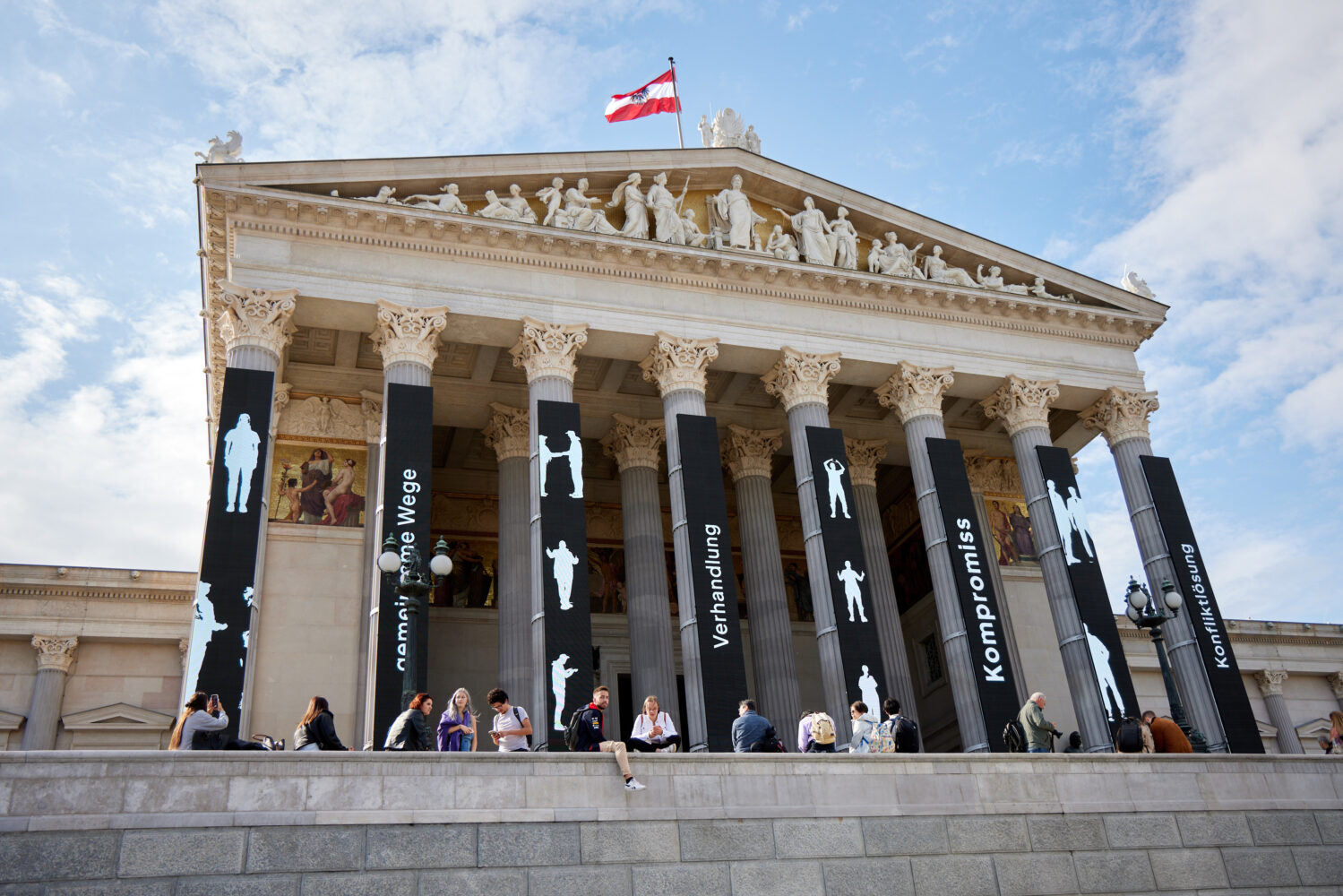
The art project #eachnamematters took place for the fourth time in 2024 in cooperation with Ars Electronica. This year, the bridgehead buildings on Linz’s main square became an impressive memorial to the victims of the Mauthausen-Gusen concentration camp system. Since its premiere in 2021, the project has been a powerful reminder of the 90,000 people who fell victim to Nazi terror in the Mauthausen concentration camp. The projection of the names of the dead creates a place of pause and reflection – a strong signal against forgetting and for a conscious, reflective society. Remembering is taking responsibility. #eachnamematters shows that art is an important medium to make the past visible, to create space for reflection and to reinforce the importance of human coexistence in the present.
Having highlighted the fundamental pillars of democracy, it is now important to highlight the culture of remembrance as a central element of our society. For a living democracy needs an awareness of its history.
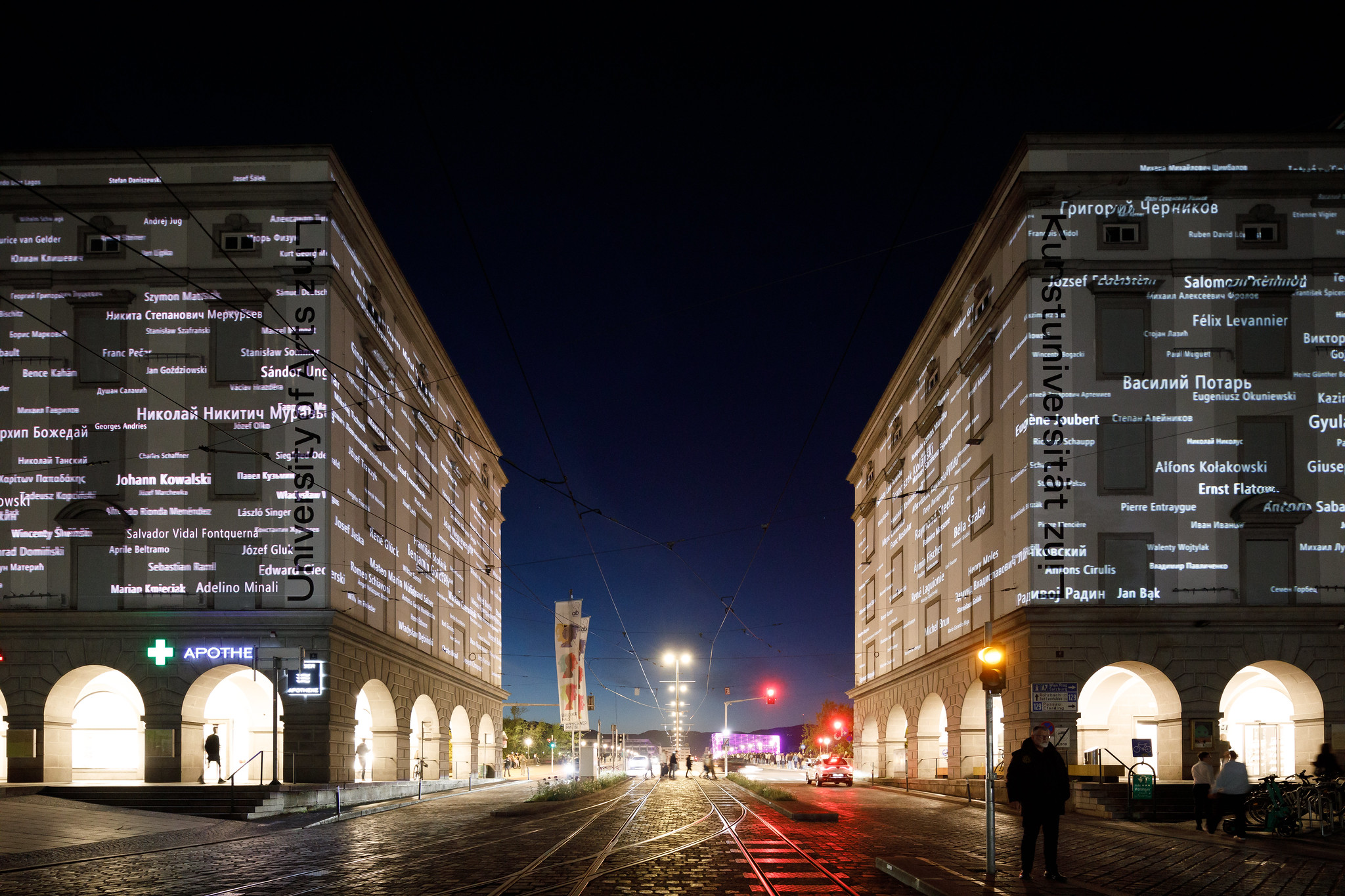
A sustainable society is created where art, technology and creativity come together to enable new ways of thinking and to develop sustainable solutions. Ars Electronica offers not only a space for dialogue and reflection, but also the opportunity to actively shape change together – for an inclusive, innovative and livable future. With this in mind, we say goodbye to 2024 and look forward to an exciting and inspiring new year together!
If you would like to join us again next year on this exciting journey and become part of the Ars Electronica platform, you are welcome to follow us on our social media channels such as Facebook, Instagram, LinkedIn, and Youtube zu folgen, subscribe to our Newsletter or visit us at the Ars Electronica Center.
















